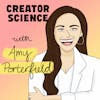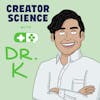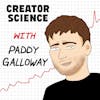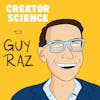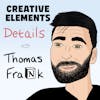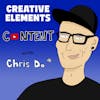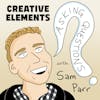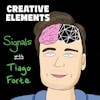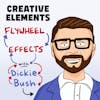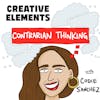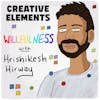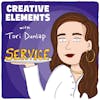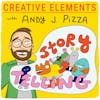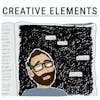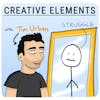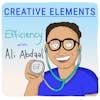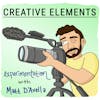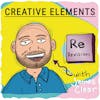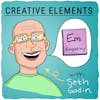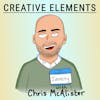
Chris McAlister is the founder of SightShift, a company that helps ambitious people be courageous and kind.
Chris McAlister is the founder of SightShift, a company that helps ambitious people be courageous and kind.
He’s authored 5 books, spoken to thousands of people, and loves the work of helping others unblock their best leadership.
In this episode we talk about separating who you are from what you do, what it means to be proving and hiding, and why becoming more comfortable with your identity can be key to unlocking your creativity.
Transcript and show notes can be found here
***
LISTENER SUPPORT
Join our community on Facebook
Support this show through Buy Me A Coffee.
***
SPONSORS
Try Podia and save 15% for life as a Creative Elements listener
Start your free trial of SavvyCal and get your first month free using promo code ELEMENTS
***
ABOUT JAY CLOUSE
Subscribe to my weekly newsletter
Enroll in my course on podcasting, Podcast Like The Pros
***
PODGLOMERATE NETWORK
This show is a part of the Podglomerate network, a company that produces, distributes, and monetizes podcasts. We encourage you to visit the website and sign up for our newsletter for more information about our shows, launches, and events. For more information on how The Podglomerate treats data, please see our Privacy Policy.
Since you're listening to Creative Elements, we'd like to suggest you also try other Podglomerate shows surrounding entrepreneurship, business, and careers like Rocketship.fm and Freelance to Founder.
Learn more about your ad choices. Visit megaphone.fm/adchoices
Chris McAlister 0:00
When you don't know who you are, you live in a felt reality of what you want to project to others you're trying to prove or hide something you're trying to, you know, blow yourself up big and and convince them of something or you're diminishing or you're hiding.
Jay Clouse 0:16
Welcome to Creative Elements, a show where we talk to your favorite creators and learn what it takes to make a living from your art and creativity. I'm your host, Jay Clouse. Let's start the show.
Hello, welcome to another episode of Creative Elements, the first episode of Creative Elements in 2021. It is my resolution this year to keep grading great episodes for you. And I hope you'll resolve to keep listening and telling your friends about the show. We have some incredible guests coming up this month already. And the more the show grows, the better I'll be able to keep reaching higher and higher profile guests. One of the best ways you can help the show in 2021 is by leaving a review on Apple podcasts. I read every single one of these reviews. And they mean a lot to me. I'm not kidding. I'm grateful to the 138 of you who have already left a five star review, including this review from para parasailing that reads quote, literally one of my favorite podcasts, thoughtful questions, concise intros and commentary. doesn't waste your time well produced interesting interviews. There's really nothing like it refreshing content in a sea of self promotion in the creative space, and totally worth your time. Thank you, Jay. And quote, thank you para parasailing for the review. It means a whole lot. And if you leave a review on Apple podcasts, I just may read it on the show, too. Okay, so about today's episode, this one is a special one. Back in January 2017. I hired my first business and creative coach. I was working as a product manager at a healthcare startup and I wasn't happy. Before that job, I had been a co founder of a digital ticketing company, which was acquired in 2016. And going into a company where I now had a boss, more expectations and less control. I struggled. Several of my friends recommended that I work with their coach named Chris McAlister, I think I probably had close to a dozen people who I knew and respected recommend this guy. And so finally I decided to give it a shot. Chris is the founder of SightShift, a company that helps ambitious people be courageous and kind. He's coached hundreds of individuals, not including the hundreds, if not 1000s of employees impacted by the leaders and organizations that he's worked with. Chris is really prolific. He's written four books. He's a speaker, he hosts two podcasts, he coaches leaders and individuals. And he even trains other coaches to
Chris McAlister 2:45
SightShift is just a way of it's like a meta viewpoint on life. How do you make sense when so many of the worldviews and boxes are collapsing.
Jay Clouse 2:55
That was Chris, he built SightShift to help people discover their mission, work and career by using all their experiences, desires, setbacks, and hopes. This became a mission for him when he hit his own rock bottom in his 20s getting built a multi million dollar real estate business only to lose it all in the 2008 recession. It was at this point that he says he realized that his worldview wasn't serving him the way that he thought that it was.
Chris McAlister 3:17
And I had to learn it the hard way I wish I would have learned it like positively I mean, I'm sitting on the deck of our custom built dream home, you know, my kids are playing on a waterslide. And I remember thinking I've worked so hard, this is all the good feeling I get from this. Sadly, I'm not that kind of person. I don't wake up when it's good. I'm the kind of person who wakes up when it's bad. So fast forward a year and a half, we've gone through all this loss and and, you know, gone from second custom built dream home to the house that we're running in, but to get evicted. And, you know, I'm like, wait a second, do I feel better about myself if we stay or worse if we go and I was able to cognitively and experientially separate who I am from what I do.
Jay Clouse 3:59
We'll talk a lot about that separation of who you are and what you do in this episode, because that fundamental wrestling with identity is what forms the bedrock of Chris's teachings. And once he realized that his identity was wrapped up into the real estate career that was crumbling right in front of him, he began studying what identity really meant. And as he studied identity more and more, he found himself getting more comfortable with himself.
Chris McAlister 4:22
And then I went and cut out like studied wisdom all over the world. I was cooking all this down into stuff that was helping me and figuring things out. And then over time, that turned into a coaching program called Figure that Shift out. Because literally, I had friends coming to me for help. They were seeing what was changing in me. And I was figuring out like, Oh, you help people with this and then they asked about this and then if you do this next they get this far. And over time it just got cooked down into this like introspective exercises that are resistance based as much as you put into them. They give you back and people told people about it. And here we are.
Jay Clouse 4:59
Chris has a fascinating background. He has a seminary doctorate, he served as a pastor. He spent time as an adjunct professor teaching religion. And he pulls stories and wisdom from all ancient teachings and religions, which makes for a lot of fascinating conversations. Just a few months ago, he released the Polycontemplative podcast, a series of episodes exploring the timeless stories from the Bible, not for religious purposes, but to pull out the human wisdom inherent in those stories. It's called Polycontemplative, because it's about thinking about these stories from any background or lots of backgrounds. It's a really interesting, cozy Listen, I've learned a lot from Chris and I give him all the credit in the world for helping me to become more comfortable with both my identity and the things that I actually want in this life. Shortly after working with Chris, I left my job at that startup to go out on my own as a creator. So in this episode, we talk about separating who you are, from what you do, what it means to be proving and hiding, and why becoming more comfortable with your identity can be the key to unlocking your creativity. I've spent a lot of time with Chris. So this is a very conversational episode. I'd love to hear what you think about it. You can find me on Twitter or Instagram @JayClouse take a screenshot at listen to this episode, tag me, let me know that you're listening. And if you haven't joined our creative elements, listeners group on Facebook, the link is in the show notes. Okay, let's get existential, let's jump right into talking about our identity.
Chris McAlister 6:24
What I mean by identity is not what people think what they hear, I instead would mean something more like what my Angelo says, you know, I'm black. I'm Simone, I'm African. I'm a woman. I'm all of these. But none of these is all of me. So some of you isn't the some of you your race, gender, creed, sexuality, these are all parts and markers of who you are. And what's happened in the Western world is we've lost 1000s of years of wisdom from ancient traditions all over different cultures that helped us understand beingness, or ism, this is much more than any specific way we would describe ourselves or our tribal affiliations. And so first and foremost, it's just understanding that you're trying to construct an identity. Everyone is I mean, the Greeks wrestled with this with the Ship of Theseus. Right now what's happening on the extreme right in the world, they're lifting up certain identity markers better than others. And then on the extreme left, way left, a liberal approach is taking whatever identity marker that is the most violated or invalidated, about who you are, and making that all of you. So then that, you know, that just is all of your experience. And what we do is, we say, Hey, listen, you can go get your identity violently remade in the military, you can get your identity remade in pressuring narratives, like you better go to college and get this degree and you know, that whole thing, or you can do a deep dive on figuring out who you are, you know, Carl Jung says the privilege of a lifetime is becoming who you are, then out of a secure identity, it will overflow to a clear mission. And then it's not something you're pursuing to make others happy or out of shame. Instead, you're pursuing it out of desire. So you're unstoppable. I mean, what could happen to you just keep going, working with so many business owners, some businesses fail, I've had that happen. But when a business fails, it's just because you're basically saying, I don't want to pay the price to iterate anymore for this to keep going. And that's okay. But when it's your mission, your capital and mission, it transcends all you do. There's no stopping, you know, how to bring who you are and what you do. And then you build relationships around that. So you don't have to seek a community that gives you what you need. You engage community to give paradoxical things you're going to get like crazy from that community, because then it becomes this beautiful symbiotic relationship.
Jay Clouse 8:43
If I'm coming into the figure that shift out program, when I leave that program, 12 weeks later, what's different in me? Or what can I kind of expect by going through that process?
Chris McAlister 8:54
Yeah, at a very straight level. It's like three clear benefits. You figure out your path, you find your path, how do you show up in your doing and your work and your career and your mission and your calling? How do you focus who you are into that? How do you make decisions that are out of you finding your own path, because what a lot of people don't realize is there's so many narratives that are affecting their decisions. There's so many internal psychologies that are shaping the way that they process and approach things. And when you can get into a clean pure state, you know, you know what it's like when you've gone for like a really long run, and you feel really optimistic about the world. And, you know, there's just a lot of purity and, and, and clarity in your thinking, how to get there on demand and your decision making. So focus, decision making, and then third, enjoying relationships, everything that blocks up the building of quality relationships. The cool part for me is to hear from people years later, I mean, we had somebody find us through the podcast like five years ago from Finland that just reconnected with a few of them. By video, and they're saying like years later, here's what still happens to us on the daily. So at the core of it, you're learning a way to cooperate with a process of internal change. So that that focus, and that good decision making for you, and those quality relationships, keep going. Because the reality is you're going to face new struggles five years from now, seven years from now you're gonna have new responsibilities, new opportunities, it's not that you're moving backward. That's what people think it's that you're expanding. And how do you effectively expand into that new territory of who you're becoming. Well, we teach a way to cooperate with a process so that this just overflows into focus decision making good quality relationships. But to get people to that point, you got to do a lot of internal stuff.
Jay Clouse 10:49
I want to share a little bit of a story and behind the scenes with the listeners here, because we haven't had much time on the show, honestly, to talk about my story. When I started working with Chris, it was after I had sold my first company, it was like a tech startup. And I was working a job as a product manager at another startup. And so for me, I had just spent almost three years wrapping my identity around being a co founder, C level person at a startup, once that sold. Yeah, that was good. And that's something I could talk about. But then that identity was gone from me. And I really struggled with taking the job, because that was a new identity. And I thought, this is going to change the way that people see in regard me. And then at that job, I was unhappy, because it wasn't really the identity that I felt like I really wanted. And so in working with you, Chris, the the real benefit was, I was able to stop caring about the identity I thought other people were seeing in me and start building the identity I wanted for myself, which like had an immediate calming effect on my decision making on the way I spent my time. And I could immediately feel people around me gravitate to that, like, why are you so relaxed? Why is it so easy for you to make these decisions? And this is kind of a three line to everything you're saying about focus decision making, leading to higher quality relationships. So that process really did play out in my in my experience.
Chris McAlister 12:17
Man, that's awesome to hear. Yeah, I mean, your brain is literally has a movie playing in its head. And you don't even know what that movie is. We talk about it in terms of identity fears and their identity fears that are triangulating everything in your movie, it makes your brain on fire. And what happens when your brains on fire, you're constantly trying to construct an identity around what you do. I mean, you ask the average person who are you, they jump into roles or relationships. And until you can separate who you are personhood, from your performance roles and relationships. You'll never know who you are fully. And when I talk about this, like with companies when I come in and speak. And if we're doing a longer thing, and I'm giving them away to work on it. It's so fun to go, Hey, come back and tell me who you are. You know, of course, big group just fill it out and worksheet but but who you are, but you can't use roles or relationships to describe yourself. Well, the looks that I get from the engineer team is this guy's full of BS, because that's an unsolvable problem, at least one person from the sales staff may come up who's a little more aggressive and is like, I can't do this, like you suck as a teacher. And, and for me, it's like amazing when we help them see that, you know, and the favorite thing for me now is to get notes from our certified coaches, because they take people through that process now. And we've got it, you know, step by step, how that works. And what is the result? It's exactly what you described. You relax into your brilliance, you you have the ability to shine with the brilliance to be the fullness of who you are, it gets blurred by your shame by being insecure, by being afraid, building your identity around what you do when that goes away. Awesome, man, let's let's have some fun. Let's play it do the stakes still matter? Yeah, we have an athletic brand championships where we do this exact same process. The guy that leads that's a coach in the NBA was the head coach, the jeely, one of the G league teams for it all got shut down. And it's the same for them too. They put their identity around being a player, you missed two shots while I suck. And then shame keeps you from getting into flow.
Jay Clouse 14:26
I'm gonna tie this to an earlier episode of the show where I was talking with Vanessa van Edwards from the science of people. She was talking about some of the scripts that you have when you go to a networking event that you ask people like, Well, what do you do? And people are doing this thing where they're responding and saying, Well, I'm an engineer at X, or I'm an account manager at Y. They're really tying their identity to this role as you're saying or sometimes a relationship. I'm a father, I'm, you know, a husband. Those scripts don't lead to memorable interactions. And they also show you that you have this dangerous connection to a thing that is, in some ways out of your control. So when you lose that job, you know, that's where a lot of people feel problems. And that's happening a lot right now a lot of people are losing their jobs. And for a lot of creatives listening to this show, I think you can also relate to maybe your emotions, or mental health being really tied to how well the business is going right now, or how well that client is receiving your work. But if you remove who you are, from what you do, you can create some distance in your your happiness in your emotions from that feedback. Absolutely. Yeah. After a quick break, Chris, and I continue our conversation about the impact of separating who you are from what you do. So stick around, and we'll be right back. Welcome back to my conversation with Chris McAlister. Chris and I were just talking about the positive emotional impact of separating who you are from what you do. And Chris told me that not only is it good for your mental health, but allows you a lot of flexibility and how you show up in the world too.
Chris McAlister 16:02
You also get the more strategic ability to be savvy and influence, which is so fun. For me, it's it's illustrated well. I think, my daughter's 14, 16, 18. You know, they get mad sometimes. And it's funny, they're like dad are some of our friends, like they think you're a legend. But they use that word. Like they're mad about it. And it's because I'm not tied to a specific identity. So then I can show up lots of different ways. And I know that I'm being memorable, I know that I'm doing things that make me stand out with them. We actually have a training that we do to help you know, whether it's executives, professionals, sales, leaders, whatever, do that very thing. It's a progression that you can actually develop. And what most people don't understand is like this wisdom is everywhere. I just was able to codify it in language and put it into a process. It's not a discovery of anything new, just a rediscovery of what's true. Steve Martin in his masterclass on comedy, talked about this idea about, you got to learn how to build around the worst parts of who you are. And he could only language at the way that he could because of his experience. But you can see that he had this ability to know he had a core and a center. And so then he could be malleable in the way that he shows up, man. It's so fun. It's so fun.
Jay Clouse 17:18
I think I told you the last time we talked, literally when I was working with you three fingers that shift out. We worked through I think it was week two where we identify one of the lies that you're telling yourself at the same time that I was identifying the lie that I was telling myself, I came across the preview the trailer for that Steve Martin masterclass on comedy. And it like, was the perfect timing fundamentally changed my life, I'll try to find the audio clip. Because he basically said everything that happens to you is material like you can use that.
Steve Martin 17:48
I never actually thought I was funny. You may think I don't have any talent. I guarantee you. I had no talent. None. Remember, you are a thought machine. Everything you see here, experience is usable. Oh, what? Oh, whatever makes you unique as a performer to do it, and know that there's room for you. Hey, welcome to Steve Martin's masterclass.
Jay Clouse 18:22
And that was so empowering. Because the lie I was telling myself was, I'm not creative. I can't go out on my own because I don't have creative ideas. Can you talk a little bit about the idea of these lies that we tell ourselves?
Chris McAlister 18:33
Yeah, yeah. Well, once you and the language I like to use now is, you know, once you figure out that movie playing in your head, so when people go through our coaching process, whether it's with a group or one of our certified coaches, we dedicate a whole chat to like, zeroing in on what that movie is. Because that movie is the thing that showing up when you're stressed when you're stressed. That movie takes over. And that movie starts to kick in. And then that lie of your identity, that shame based, is keeping you from tapping into that brilliance that you have. And so what's so powerful about it is, you know, exactly like Steve Martin says, it's all material. When you learn to understand not to beat yourself up. I mean, for anybody listening to this right now, like if you're hearing some of this and going yeah, I suck. I'm holding myself back and shame and fear in life. No, no, that got you here. Your ego isn't the enemy. It's a gift. Everything that you would beat yourself up for it got you here. Way to be amazing. Life has so many hardships to it. So many challenges. It got you here. The problem is it just won't get you there. So what you've got to start doing is relating to what's happening to you differently so that you can see everything that happens to me becomes something that happens in me. How do I cooperate with that, so that it shifts to happen through me. And then I make it happen for me. And that is exactly what he was talking about in that masterclass. It's all material for growth. But when we feel insecure or stressed, and then we show up too big or too small, we're missing the mining opportunity of going in and getting what that goodness is. So you know, everyone is challenged, nobody has it all together. And anybody that pretends that they do is is full of BS. Instead, the healthiest among us just learn to cooperate with what's happening, and use it for their growth. That's the fun part.
Jay Clouse 20:42
For people listening to this who are saying, Man, I need to do a little bit of work on how identify the things that I'm spending my time on, I want to cultivate more of the true me here. What are some of the steps that they should be taking to get to a place where they are getting to this true self, they are not living in shame, and they're starting to express themselves more freely.
Chris McAlister 21:05
Awesome. Well, and that for me is the the life obsession, the work what it's all about. So I can point him to stuff we said, but I think to give them a little bit more to work on. And this, they can spend as much time as they want on this would just be to notice a few things. One, look for any like whispers or hints of purpose winner, and for me, like Iki guy is great. The Japanese concept, Jim Collins heads, hedgehog concept is great. Those are great, great starting points. But I needed something deeper. I mean, I read every book I could find on purpose and mission for like a decade, trying to figure mine out, even while I was doing work that had a public leadership capacity to it. And, and I'm speaking and whatever. So So Iki guy and hedgehog concept can be great to start at. But But for me, that wasn't enough. And I needed more. And I looked for more. And I developed just my own that helped me and, and one of them is just yeah, look for those whispers of purpose, those hints of calling those man I really like doing this, I was meant to do this. And, and, and this, this has a quality to it that draws me and now it's hard and it takes time. Navall says like it takes about 10 years, that was his estimation that I heard him say, I don't know if they knew Navall is philosopher on Twitter and Angel list. But you know, you're you're bumbling your way into this clarity. And having guided people to this and live this for myself, I can say that that timeframe is not that far off, we can help accelerate it. But even when you start to get a lot of clarity, the clarity, never pixelates. It's an endlessly. Like, you just keep zooming in and getting more focused and more effective. So look for those whispers of purpose, I would also start looking for the opportunities where you are passionate about the skills, too many people try to figure out like the whole composite picture, look at the skills you're excited to learn. That was for sure. Such a guiding reference point for me, I would just be like, okay, I don't really know about that. But I want to learn how to do that. And if you'll notice those skills, then you can start to get curious. And this is where I would encourage them to just wander without shame. Like, so you want to go try that, go try that, go figure that out. And and you know what, there's always going to be reasons why you shouldn't or couldn't, and it doesn't have to be your full time thing. And you could do it on the side, people get all that. And then last, and this is the weird one, embrace those lower parts like and that's a little bit of the Steve Martin built around the worst parts of who you are, what are those? If you're seeking, the higher, the purpose, the calling? What are those lower parts those like, this is what I want to do. I don't want to do that. And it feels selfish or irresponsible. And if you're trying to do it, to prove yourself to the world, it's going to be off you. So you got to figure that out. But a lot of what feels selfish and irresponsible, is you breaking out against the narratives of who people tell you you should be. And so kind of like an overlap of those four circles, or how I approach it.
Jay Clouse 23:51
Totally, I think one of the greatest strengths that I have today is my ability to approach an opportunity or a decision and very quickly just cut out the stuff that doesn't matter and relate it to What do I care about? Where am I going? And I'm realizing that that's a skill set that I've really only honed over the last few years since working with you. So what what is it about the way that we're raised or put through society that makes it so much harder for us to just be clear about what we want and have that lens automatically.
Chris McAlister 24:22
Man that's so meaningful to hear. Thanks for saying that, you know, you've got a number of factors and and you can put this in a box of language that people can get, depending on whether they have more of a therapeutic background, analytical depth, psychology, maybe even spiritual or religious language. And I just prefer to put it in the language of leadership. I think for me, it's got a little bit more of a plain speak approach so that it strips away unnecessary nuance and confusion. So you can think about it this way. You are the combination of three things, your neurology how your brain has formed. Now your brain has formed around a number of different experiences that you've had, you have a normal, or you have your baseline that you're born with whatever normal is for you. But then from an epigenetic standpoint, different experiences are happening to you that are switching on different genetic markers. So I think it was a neuroscientist I heard I heard say this, I said this to like my 18 year old daughter a couple days ago, and you could tell she was like, Whoa, if you could put yourself in somebody else's brain, you would feel like you're tripping drugs, because their reality is so different from yours, you know, your viewing reality. So your specific neurology and your new neurology is also shaped by your physiology, you know, how you're experiencing your body? What you've, you know, at what kind of supplements do you take? Do you process those? Well, what's your health, like, there's so many factors that affect your physiology, like 90% of your brain is in your gut. And then these two kind of come together to form how you're actively shaping your psychology. So I think about all three of these, like a Venn diagram, that make up who you are. And the thing about psychology is the weird reality, every human being struggles with shame, and Rene Browns in a lot to popularize the concept of shame, which is awesome, because I can use her name, and then people get the concept. But shame is just when you feel bad about who you are. And you don't even realize how intrinsic that can be to your thinking and your circumstances and all the things you tell yourself that you can't be. So for me, when people get an awareness of these three things, and I can talk about it, you know, in different ways of processing it, that's when they can cooperate with getting out of their own way. Because your experiences lie to you, trick you, you know, right now, everybody is convincing themselves of whatever the results are in the political scene in this country. And they're forcing a narrative to make sense of the reality they want to be true.
Jay Clouse 26:57
Something that I've come to believe that I think came from having a discussion like this with you, is that shame, because that is a feeling about who I am. Versus guilt, which is more of a feeling of this is what I have done and how it impacts other people. At some point, I just came to the decision that I was not going to feel shame, or let other people shame me, which has been super empowering. Is that a good way to be and think or is that problematic?
Chris McAlister 27:24
Oh, that's awesome. I love that. I mean, yeah, if you want to think about like the core of who you are, who Jay is, and I know that this is weird language to use, but scientists cannot define consciousness, we know that there is something there. And, and there's the core of your consciousness. And what happens is, when when you don't know who you are, you live in a felt reality of what you want to project to others, you're trying to prove or hide something you're trying to, you know, blow yourself up big, and and convince them of something or you're diminishing or you're hiding, and you're you're doing that, you know, you're living that projection because that shame is there. So if you can notice the projection and peel back, notice the shame, where you feel bad about who you are, then you get to that core. Now, you live free, so absolutely not bad. Now, the way I think about it is and we can talk about what follows this, the key goal in life is to become unshakable. And and then you're unstoppable in your mission in your own cancellable in your community. You're living your life, your truth. Now, the dangerous part here is there's a psychotic, unshamable approach, right? And, and that's the thing. I mean, the people that are the happiest in life, that lived the life that they want to live on their own terms are either psychotically unshamable, or they learn how to be unshamable. And it translates into work that makes the world a better place that they feel meaning from, and then they build quality relationships they enjoy. So you either have to sear consciousness, which kills shame, or you can transform it. And that for me is the obsession, get people to notice it and transform it.
Jay Clouse 29:07
I love the word you use of notice, because this is also a skill that i think i honed in working with you. I think this is probably intentionally designed. But I've gotten a lot better at just noticing how I feel about certain things when I'm feeling dread towards something when I'm feeling excited about something when I'm feeling not so good about something or even someone. And I think that skill was honed from this exercise you started each of our calls with which was basically what were moments where you felt like you were proving or hiding this week. Can you talk about those concepts for people because I think that's something people can walk away with and start to really hone in.
Chris McAlister 29:43
figure that shift out is designed to be a step by step guide, how you can rebuild yourself or fully activate and maximize who you are. And some of the other concepts we've been talking about like Polycontemplative, like that's where all of those ideas and concepts exist in The world traditions of wisdom, but fear that shifts out how we do it step by step. So I don't know of a more powerful tool than asking, Where have I been proving or hiding recently, or this week. And so that's why all of our certified coaches, they start every chat the same way. Because once your brain starts to notice it, it's like an antenna. And so we just tell people, we want you to construct this antenna, once your brain notices it, you can't help but change your behavior. You know, so I've been married 20 years. Let's say we get off, get done with this recording, and I go upstairs real quick, and, you know, get something to drink. And my wife goes, Hey, do you have any meetings? rest of the day? Well, why are you asking me that? Right? I'm not saying this out loud. But I'm like, we need something from me, do you think I'm not working. If I don't have meetings, am I not working? You know, this is where people's brains don't realize how much it kicks in with the proving and hiding that begins, you know, so then I lose who I am. And I just say yes to everything or over to aggressively defend the boundaries. And the proving or hiding is a way that you tune in that antenna, so that you notice it. Now, it's great if you notice it afterward, because that's still noticing it over time, you'll start to notice it, when you do it. You'll notice it before you do it. But proving and hiding is a manifestation of shame. And there is like there is no leader ever that I've ever coached, from Fortune 50 presidents to companies of $100,000, and everything in between, everybody's proving and hiding. Everybody, they have a little bit, a medium amount, or a lot. And if you only have a little bit, it means you're not that stressed. Or you've kind of, you know, possessed the area you're in with a secure identity. But life has a way of throwing that off balance. And when it throws it off balance, that's a great point. That's when you grow. That's when you really get zeroed in on what your specific identity fear is, and what holds you back. Too many people though, run from those.
Jay Clouse 31:59
I want to underline that and give kind of a specific example. Because I think people really need to hammer this home and understand it. Basically, any interaction you have. you're responding to it, subconsciously and consciously. Like, I like to use the example here is an example with me and my girlfriend, maybe we'll have a conversation, she'll say something, no matter what she says, I'm responding to in some way I'm trying to put meaning onto what she said. So maybe she'll come in and say, Have you taken the trash out? I will jump to something like why are you micromanaging me? Or do you have reason to believe that I wouldn't take the trash out. These are the emotional things that are happening in my mind that if you don't recognize them, you might respond externally, emotionally, too, which is not good. Whereas if you can notice these things, you can control how you respond. It's the same as if you get an email that you're upset about. Instead of responding out of anger, pause, notice how you're thinking about this. Ask yourself, are they really saying that? Or am I putting this on? and go from there?
Chris McAlister 33:03
Yeah, man, that's beautiful, beautifully stated. For me. Everything is about noticing that interaction, because to go back to the first rate intelligence stands in the electric middle of two ideas, to not hide and to not prove has to be you know, it doesn't mean if I'm strategically influential, I'm proving it just means if I'm dropping in things to be convincing. Those serve me rather than me blindly serving them. That's everything. And I'm going to answer the question directly about what hiding is. But I want to also say, because there's a different movie playing in your girlfriend's head. You know, she's asking about the trash and you're like, making it about performance. She's literally just asking if you got the trash like, that's it. But but we we hear a different movie playing in their heads. I mean, this is why corporate communication breaks down so much leadership in the boardroom. Parenting, let's use parenting, for example, you know, I parents to the movie in my head, which tends to be about performance. So to be aware of that my wife, parents do safety. She's, you know, wondering where our kids are making sure they're okay. I'm like, they're fine. I don't even worry about that different movie. I could say out loud in a meeting. Hey, guys, come on. I know we can do this. We're falling off here. Let's get this together. Unless freaking get it going on. I'm trying to draw potential. I'm inspiring them how I would inspire myself. Let's get better performance. People have different movies playing in their head. They go Oh, Chris has been intense. He wishes I wasn't on the team. Until I know how to separate perfect performance from personhood in my own life. And then in my communication, I'm always going to have those exchanges like what you're talking about your girlfriend, hiding the way that that shows up. You're not bringing the strength and fullness of who you are. your opinions, your thoughts, your desires. You know, you're sitting in the meeting going this. If she calls on me, I'll speak up. And then somebody beside you, goes, you know, we need to do here we need to and then on the inside you go. Either I miss my opportunity, I always miss my opportunities. And again, you aren't even conscious that that's, you know, Oh, look at that I'm not that special. She had the idea. I had the idea. I'm just one more among many, all the ways that shame starts to hold us back. And so hiding, hiding, improving. You know, that's, that's what trips us up.
Jay Clouse 35:24
I love what you're saying about the breakdown of communication because I feel like so much conflict just comes from people putting their own meaning onto a circumstance which is coming from their own movie, as you're saying, which doesn't match up with the other person's movie. And so that projection just like fundamentally isn't true. Yeah, I go back and forth on, I want to lean more into my intuition. Versus I know that when I project is generally not a good thing.
Chris McAlister 35:53
Yeah.
Jay Clouse 35:54
How does? How do you think about like intuition versus projection?
Chris McAlister 35:57
Yeah, well, that's the idea like, shame blocks, you understanding who you are, that's your intuition. And then you're projecting that proving or hiding out of that shame. So how do you get to that intuition? Well, you know, throughout human history, we've used different ways to describe it. Most people would be familiar with like unconscious, subconscious, conscious, you know, the unknowable parts of who you are that knowable parts in your known conscious reality, you want to learn how to drop those walls, like dreams, drop the walls, that's how you can get, you know, unless you ate some bad food, you know, there throughout human history, I mean, it's like your subconscious is working stuff out, man. You can randomly have these moments where, you know, I had to make a change in 2014. And I felt like stuck. But I didn't realize I had ignored something a desire, I ignored my intuition. I had to get my body moving. And I went for this run. And I was like, Oh, my gosh, I'm stuck. Why am I stuck. And my mind went back to a moment that I suppressed a desire, like six months earlier, that was a massive change I needed to make. My wife asked me a question that helped a ton. And, and those kind of came together for me to go at my subconscious unconscious truth, my intuition, this is who I am is Ram. So to hone your intuition. That's the secret magic of it all. Now, here's how most people do that. They're reactive. And then they get logical or rational, that is a step. But it's not the end game. And so you know, I'm reactive. And then I started understanding first principles. I'm reactive, and I start learning, decision making heuristics. I'm reactive, and I start learning mental models. That's great. But what happens over time is your left brain becomes so dominant, that your life just looks like decades on repeat, because you've missed it. Ray Bradbury says this thinking isn't living thinking is the container that holds living, too many people went from being a reactive child, to a thinking rational adult, they never made it through to the other side, which is how you hone your intuition, where you become childlike, again, without the childishness. And the way I like to think about it is it's a dance with my brain, I learned to let my right brain get one second ahead of my left brain, my left brain still provides the logic, the rationality, the infrastructure, the scaffolding, the discernment, but my right brain is wide open. And because it's open, that's where that's a creative spigot that you can't turn off, it's just there for you. It's going to get shut down. If the left brain starts leading the dance, you start proving it, you know, it's beautiful. This is how we hone our intuition, you become your own best guide. And the reason we're having such a crisis in society is because our institutions are failing, because they're trying to remake us in their image, tell us what our intuition should be. We need new institutions, and we're not going to have them for a long time. And until we have them, we need a lot of healthy individuals learning how to hone their intuition. And it's usually going to not fit with the institutional narrative.
Jay Clouse 39:11
When we come back, I dive into Chris's background and how he built up this knowledge and perspective around identity, mission and community and right after this. Welcome back. I've always really, really admired Chris's perspective. And I admire it because it feels like he just has soaked up so much wisdom over the years. Every time we talk, he references a classic book or an ancient idea. So I asked Chris, how he's built up this perspective on the world.
Chris McAlister 39:37
So if I summed it up, the easiest way, I've got my experience and then my study, my experience was I was raised in an evangelical Christian home now I'm, I can remember being in the ninth grade and open up a encyclopedia, you know, you have these hard copies at home. And I'm reading about boa constrictors and and pyramids and trying to figure out like, how Egyptians built these and so I've always had this like nerdy curiosity edge to me, but really like no purpose and direction at that age, and, and always, you know, pushed away from it. And I can go into as much detail as you want. So I'm not avoiding anything but just for brevity sake, went through some experiences that ended up making some decisions to put my life at that time into work that was in that arena in faith building and leading and, and I could say pastoring. But for me, my experience was leading through building campaigns and buying property, and it's very leadership intensive. But all that to say, that box began to crumble. And as it began to crumble, and I started to really expand my study even more, because I've always been that person. I mean, at age 21, I could cite read the Greek New Testament, I am in that way, a nerd, I don't want anybody to tell me, like what it says, I want to find it for myself. So I did that same, you know, focused approach to just really all over the world and, and saw like most things, Niels Bohr, a Danish physicist says the opposite of a true statements a false statement. But the opposite of a profound truth, may very well be another profound truth, or F. Scott Fitzgerald, you know, a low form of intelligence picks an extreme, a lower form of intelligence tries to balance them, but he says at first rate, intelligence stands in the electric middle of two polar opposites. So if you look at worldwide wisdom, you see two polar opposites, you see traditions that say all is an illusion, transcend, this is all made up, which brings relief. For some, you can look at other traditions that say, you can have a sense of identity connected to a source, that's more than your roles and your relationships. So one focuses on the collective way, we escaped the illusion, the other focuses on a healthy me, and in my own approach, and process. And what I've found over and over to be true, is I stand in the electric middle of those ideas, as I look at the landscape of what's changing, and the internet hasn't changed spirituality or religion, yet, it will in massive ways, that's all coming. But you're still going to find people that grow up in more individual me centered traditions gravitating to we, and you're going to find plenty of people that grow up in the way and they gravitate towards the main because at a deep level, we're drawn to both of these being true, I want to know that I'm connected to it all. And to feel that and to know that I'm a part of a common humanity, and that you and I are connected in a beautiful way. I also want to know how to experience the ineffable experience, that is the uniqueness of my identity, not because I'm a special snowflake as the language goes, and I need a participation trophy for being human. It's because when I can go into that reservoir that well, you know, that's an experience that I find powerful and rewarding. So, dude, I could hit for hours on any of that. But I hope in this distinct way that helps answer that.
Jay Clouse 43:04
Yeah, totally what I just take away from all my conversations with you, you're so well read, you're such a sponge and remembering these things. And now your podcast, probably contemplative, explores ancient stories from the Bible, which is, you know, a specific religious sect, but you're not putting a specific lens on it, which I really appreciate, as somebody who I just want to learn, I want to hear stories, I want to hear perspectives. And I want to take things that I like, and hold on to them, and take them from all over the place. And I feel like that nuance is, I don't know, do you have a sense that it's getting more and more lost or getting more and more popular as information becomes more available?
Chris McAlister 43:41
It's getting more and more popular for sure is so and this is why you know that podcast isn't my OG, original podcast, I ship that'll go on as much as I want. But probably contemplatives only going to be 40 episodes, and then it'll be over. And then all I'm trying to do is get people to think about a concept. You know, for most of human history, you lived in your box, the box you are given. Your parents taught you how to think you learn how to fit in the social hierarchy of relationships, you were in, you learned, you know, what are the initiation rites for me to progress to adulthood? I mean, it was all just given to you, for most of human history, somewhere around 17th 18th century, you start to see at least into common thinking, because printing press, oh my gosh, there's other big boxes out there, you know, so so Christians are like, Whoa, there's this big box Hinduism, and, you know, oh, there's these native peoples that are over in the Americas. And all of these things are kind of happening. And you find this disruption that occurs, you know, and Nietzsche talks about it like this term, like, okay, God is dead, not this antagonistic statement, but like, the box broke, you know, what are we gonna do? Here's what's so interesting to me about right now. And I love this and I'm fascinated by it and I am too excited about it. I look at how my kids have grown up for the first in human history with the internet, there's not just a few big boxes, there's an infinite combination of boxes. And I see all that's playing out right now at a global scale, with politics and these back and forth battles that are happening, we're just working out the angst of all this, that you could have a box that you are Hindu, non vegan, don't believe in any kind of really sacred source, but you like the practices for what they do for you. And you're a physicist, right? Never before in human history, have, we had the ability to have all these kind of combinations. And so all the ways that we would try to some people up are going to go away. So I think what's going to happen, and I could be wrong on this. And this is all I'm wanting to kick off a little bit with Polly contemplative is we're going to need to be able to zoom out and draw out the wisdom that we get from these draw out the practices that we get from these understand the psychological reasoning behind it without being superstitiously connected to something that doesn't help us. Because if we don't get that together, we're hosed. Our ability to make meaning to find ourselves to understand what's going on, you know, we have not evolved past meeting those biology and evolution at the end of the day are still going to win. And because we haven't evolved past needing those, we can't throw out all of this without trying to extract How can this help me grow right now. And that's so fun for me. So what the policy contemplative just became, was like a vehicle where I can go build, you know, that's, it's just a little hobby for me, I can go into the garage and build a piece of furniture and go, nobody may like it, but I wanted to build it. So here we go.
Jay Clouse 46:44
I love everything you're saying here. And this just points to the growing importance to start to choose that identity identity for yourself. Because as you're saying, for so long, this box was handed to us, it was here are our beliefs, which are now becoming your beliefs. And we're going to teach you our way of believing and you kind of stay in that lane, because that's what you knew. And that's what you could find. And now with this infinite selection of, here are the things that are interesting to me, and that I want to align myself with how much you know, you think about like choice paralysis?
Chris McAlister 47:19
Yeah.
Jay Clouse 47:19
When you think about maybe your daughter's, the younger generation? Do they have choice paralysis around all these things? Or is it like an exciting buffet, they just want to try everything out?
Chris McAlister 47:28
Neither of those, you know, I think they have choice paralysis when it comes to career, like how to find their own path, for sure, that's everywhere, and only going to get way worse, which is why as you know, we're changing kind of the front door so that people can hook into what we do by understanding, we're going to help you find your own path, the depth of it is all built on what we're talking about. But the reason is, neither is because and and and Nietzsche actually talked about this adults go through three stages of development if if they develop and most adults don't. He called them camel lion child, you know, you start out as a camel, given these thoughts and beliefs. And the camel phase is going to go away now because of the internet, but it's still there some. The next thing is the lion. Now, Robert Keegan, who did the longest studies on how adults develop and grow, retired from Harvard. Now he's got a number of books where he wrote it with business application, he's probably the person that's most verified stuff that I put together. Like, I'm like, oh, he says it, you know, and I'm like, this is amazing, I needed quoting more. But all that to say, he found and I don't even know if he knows about Nietzsche's, you know that this exists, but he found the exact same stages. And the idea is, Jay is given what he believes, if he progresses and grows beyond that many don't. His next worldview, his next box, is going to be reactive. It's something that and that's why it's called the lion phase by Nietzsche. It's something that you are, you're more defining, you're defining yourself more about what you're not and what you're against. Right. And I did that. I mean, I, I don't believe in necessarily regrets. But I definitely like lived in the wrong career for a number of years, because I was so focused on what I'm not going to do. And if people, you know, aren't aware of that, then they're going to play into making these reactive choices when the anxiety calms down. And I'm not saying circumstantial anxiety, about like your identity, anxiety, when you know who you are, you have nothing to prove or hide your own shame and your identity within India as a child in wonder and awe, what do I want to pick up? How do I want to, I don't want to show up in the world. How do I want to create belonging, and that's what's really powerful and that's not easy. If it were easy, everybody would just do it. So in some things, in some ways, you know, this is nothing new. The territory about plays out is new because of, you know, now you can be 13 years old and experience what it means to be human. In so many different scenarios,
Jay Clouse 50:02
People listen to show our creative people or aspiring creators, how much is this idea of identity, intuition, getting past shame? How does that interplay with creativity.
Chris McAlister 50:12
Artists, so often lead the way, in being open to the right brain being open to a malleable, expressive, expansive identity, they can play with the forms and the function in a way that is their strength and a great asset. And, you know, we've coached a lot of creatives, agency owners, and everything in between in the creative industry. And the problem is, for them, not learning how to focus and harness that creativity. So so they're so used to opening up to that right brain experience, but they're not letting the left brain come right behind that in the dance. So for a lot of like, business owners and executives, their left brain is is leading the dance, and the right brain isn't there. And so they play with a band on the weekend. And they like, that's how they make that part come alive. for the, for the artists in the creative, it's, it's the opposite problem. So they're, they're wide open, but they're not getting that, that scaffolding is providing this structure to their dreams. And if they can learn to create the structure and infrastructure to their dreams, it takes a long time. But that's how they get to do the work that they want to do on demand. You know, like for me right now, six books, wrote the first book seven years ago, well, the first couple of nobody will ever know about before that, but you know, it, it Amazon sales just have steadily gone up, nothing big, I can't live off of it can't support a family off of it way early. But you know what, it just keeps going up, just keeps going up. We had our few last few months best months with the release of a new book. I've built lots of scaffolding, and, and an infrastructure around the creativity. And so that's gonna look different for everybody. You know, it could be a note taking tool, as simple as that. I want to make it that trite to packaging a vision. And, and taking people on a creative journey. You know, for people that are listening this if they provide services to others, it's one thing for you to be able to create, and see what needs to be done. It's another thing then to discern and get that into a package that you take people along the journey on. And, and it's it's the syncopation of both of those. Those are the people that can keep their butts in the seat just long enough, just long enough, they could stay in it too long. To get that infrastructure down. That's the people that inspire me, both end.
Jay Clouse 52:20
This has been awesome. If you relieve listeners of the show, with one thought or exercise to try and hone over this next week, after having listened to this, what would that advice or direction be?
Chris McAlister 53:03
Take a piece of paper and, and just write all the things that you're thinking about or worried about or feeling gratitude stressed a project coming up, make it emotional states, but make it projects make it everything, when you have those moments where you just say I'm going to sit down and let my brain run. Where does it run, and just write all these out. And then make this make them circles. So make them different sizes based on how much they dominate your viewpoint. And then just imagine this, that's the windshield, you're the driver. All it means to be overwhelmed, is to over identify was one of those stressful experiences. All that means to lose your sense, in euphoria. And and lose your grounding is because you over identify with something positive, that brings a lot of elation. I am not for the approach that says I deadened myself emotionally that has all kinds of problems with it. But I do want to know that I am more than my roles, my relationships, my experiences, my struggles, my stresses, my emotions. I'm in the driver's seat, and I can see them all. And I can identify with them as they need to. But not one of them defines all of me.
Jay Clouse 54:22
Talking with Chris gives me so much energy. He's just so positive, upbeat, and he genuinely makes me want to be more thoughtful and introspective. And I think we could all benefit from being more thoughtful and introspective. I've learned a ton from working with Chris. And this is not an affiliate relationship or a sales pitch. I just wanted to share Chris's wisdom with all of you. So if you want to learn more about SightShift and Chris's work, you can visit sightshift.com. The link is in the show notes. Thanks to Chris for being on the show. Thank you to Emily Clouse for making the artwork for this episode. Thanks to Nathan Todhunter for mixing this show and to Brian Skeel for creating our music. If you liked this episode, you can tweet at me @JayClouse and let me know, if you really want to say thank you, please leave a review on Apple podcasts. Maybe I'll read it in a future episode. Thanks for listening, and I'll talk to you next week.
Most Popular Episodes
New to the show? Check out some of our most popular episodes.






